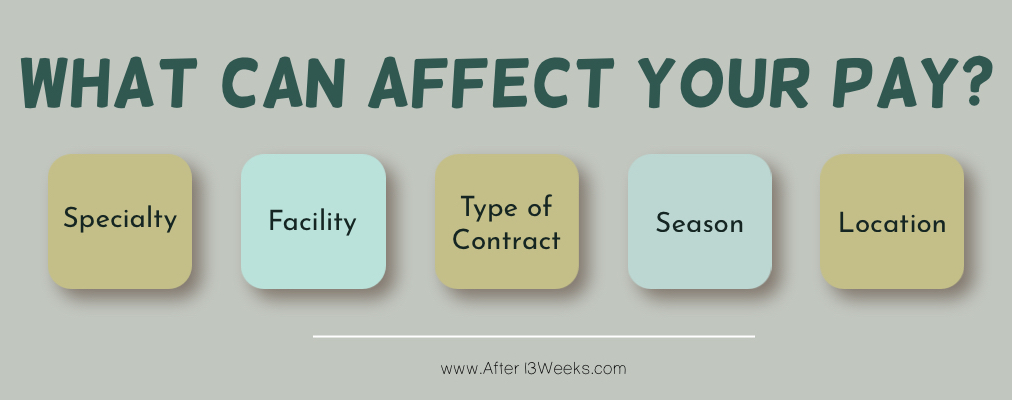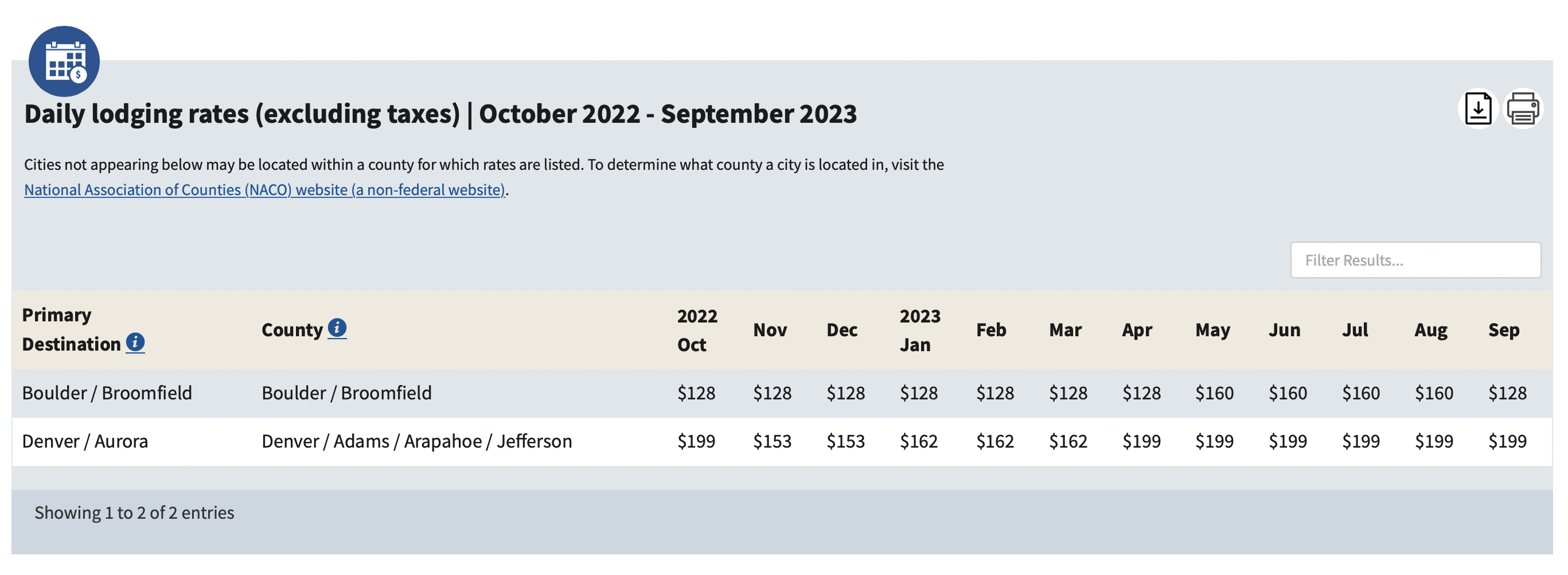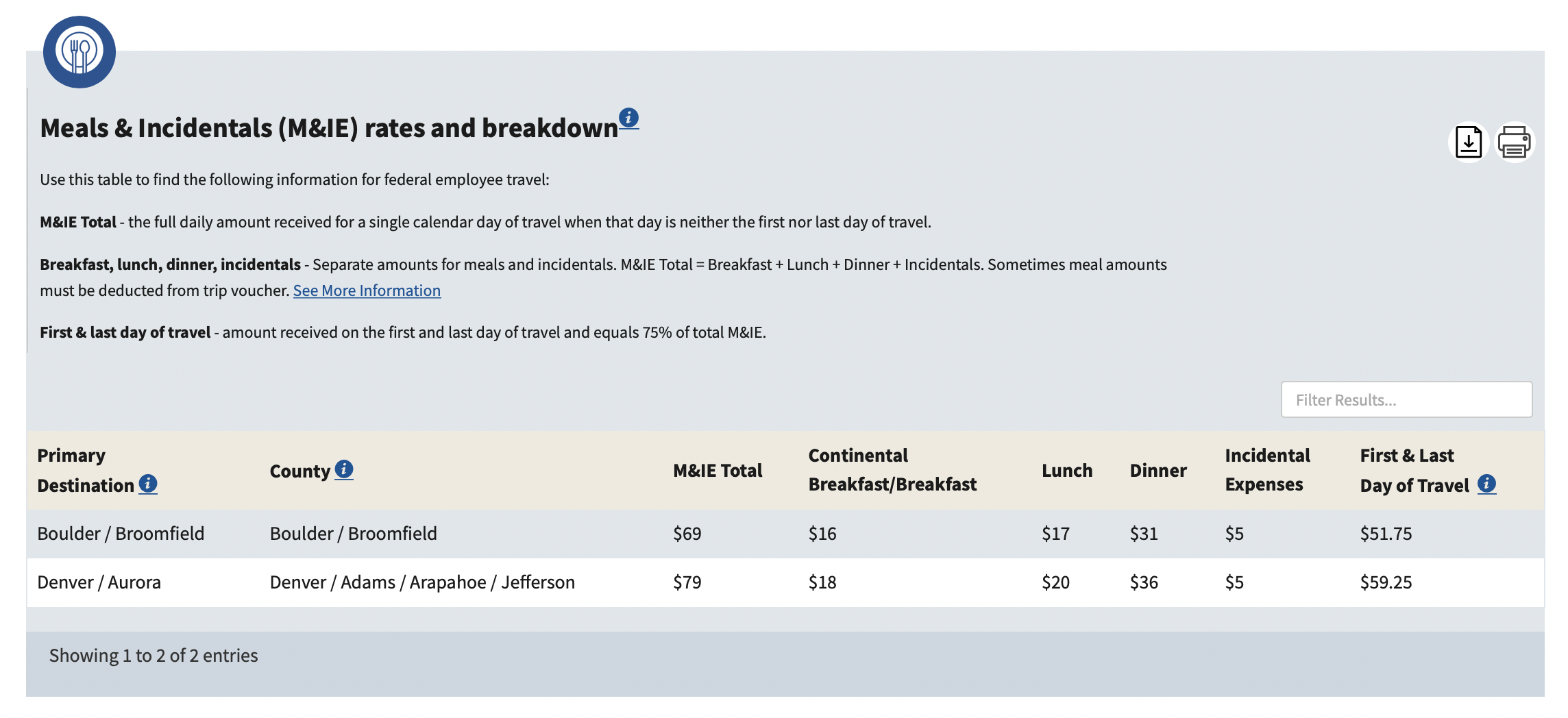How Much do you Make as a Travel Nurse?
As travel nurses, the question we are most commonly asked is “what is the salary of a travel nurse?”
This is a complex question, as there are many components of a travel nurse’s contract that affect how much you get paid.
Here are some examples of variables that can affect your pay:
- Specialty
- Facility
- Season (fall/winter vs spring/summer)
- Crisis contracts
- Location

Your salary will be determined by the number of contracts you complete per year. Some nurses will work contracts during the winter and take the summer off. Others work year round, taking a week or two off between contracts. The more assignments you work, the higher the travel nurse salary will be! Contracts are usually 13 weeks in duration, therefore you can complete up to 3-4 a year. Some contracts may be shorter (8 weeks or less), these are usually due to strikes or crisis needs.
Breaking Down Your Pay Package
Your pay package as a travel nurse has two main components: The Base Rate and Stipends.
Base Rate
Your base rate is also known as your hourly rate. At first glance, this rate may be considerably lower than your previous staff job’s. rate. It is important to remember that your tax-free stipends represent a significant source of income, and having a lower hourly rate can be beneficial.
Overtime Rate
Your overtime rate begins after you have worked 40 hours in one week. Most travel contracts are 36 or 48 hours per week (3 or 4 shifts). Make sure you clarify with your recruiter and read over your contract when exactly your overtime rate kicks in.
Holiday Pay
You should receive a Holiday Pay Rate if you work any holidays as part of “The Big Six”: New Year’s Day, Memorial Day, 4th of July, Labor Day, Thanksgiving, or Christmas.
You may also have a Call Back Rate if your specialty requires you to be on standby.
Rate Variations
Here are common factors determining your hourly rate.
Facility and Location
Working for a large, well-known facility does not always mean it will be higher paying compared to a smaller community hospital. The same can be said working in a larger city vs a smaller city. So, your location may affect your hourly pay- but your stipend will be the most affected by your contract location. We expand on stipends later in this article.

Nursing Speciality
Contracts are usually higher paying on units such as ER, ICU/Telemetry, PICU, NICU and Labour and Delivery. But this does not mean you cannot find a great-paying contract if you are not on this list. These are simply units that tend to have the most needs, and are often understaffed; thus offering a higher pay incentive.
Crisis Contracts
A crisis contract generally means that a unit or hospital has a sudden surge/ loss of staff or increase in acuity and they require extra staff as soon as possible. These contracts tend to be shorter in duration, with an earlier start date, and higher pay rate. RSV season in pediatrics tends to bring crisis contracts in the. fall and winter. My last assignment in Boston was offering 8-week crisis contracts due to the surge.
Season
Travel nurse rates are usually highest in the fall/winter and lower in the spring/summer.
Can Facilities Change Your Rate?
Your rate can change anytime before, or during your contract. Logan and I have had facilities change rates at many points in our contracts.
Most recently, the facility changed my rate a couple of days before I started, and the difference was over $500 a week.
Logan had a rate drop of almost $300 a week mid-contract and had another contract cancelled one week before it began.
You have no control over this, and are simply at the mercy of the facility. Just know you can back out of the rate change and look for another contract if it no longer works for you. In our cases, we had housing arranged, and decided to stick with the contract, even though we were taking home less.
If this happens to you, your recruiter/agency will help you navigate the process. Every travel nurse agency will have their own rules on measures you can take if changes are made mid-contract.
Stipends
As a travel nurse, you receive allocations for your housing and food. This portion of your pay is untaxed on your paychecks in the US. This differs from Canada, where stipends are considered taxable income.
*Should you have questions about your taxes, you should seek expert tax advice. If you would like to file your Canadian and US taxes with a single company, we recommend using Cross Border Financial. They will process both of your tax returns for you*
Your allocation- commonly referred to as a stipend- consists of two parts. A daily lodging rate and meals/incidentals.
Here is an example of what a daily stipend could look like working in Colorado.


Above are the rates for housing and meals for the state of Colorado, specifically the Denver area, from October 2022 – September 2023.
My last contract was in Colorado, and my facility was located in the Boulder/Broomfield area. My daily housing allocation was $128/day. If I had signed at the main campus in Denver/Aurora, it would have been $162/day. This difference is almost $250 per week!
As per the IRS, to receive a tax-free stipend, you must live 50 miles from your permanent home (in this case, Canada) and duplicate expenses to receive a stipend. Duplicating expenses means paying for housing for all days of your contract whilst still paying for your permanent home in Canada; i.e rent or a mortgage.
For example, if you plan on staying in a hotel during your contracts, you must pay for every night of those 13 weeks, even if you do not stay there on your days off.
*The exact mileage requirement can be a gray area, so it is best to speak to your recruiter regarding their stipend rules and regulations*

Local Travel
If you choose to stay in the same state for longer than 12 months you will then become a “local traveller”. This means your tax home is no longer Canada, but instead the state in which you are living in. You may still receive stipends for housing and food, but they will be taxed. Alternatively, your agency may just pay you a higher hourly instead of stipends.
*You should consult your recruiter/ agency directly regarding their rules and regulations about local travel*
Reimbursements
Your agency may provide reimbursements for expenses such as travel to assignments, licensing fees and scrubs. Every agency is different with what they cover and the amount, which will be outlined in your assignment contract.
Deductions
Typical deductions from your paychecks include but are not limited to: State and Federal taxes, health benefits, 401K Retirement plans, and life insurance.
In Summary
A travel nurse salary depends on many different factors. Each 13-week contract you sign have varying pay scales due to the factors discussed above.
Your salary as a travel nurse is significantly higher compared to that of staff nursing, which can be very enticing. Though exciting, there are many factors to consider before taking the leap. Click here to read the “5 FAQ’s by First Time Travellers” to learn more about the world of travel nursing.

Ready to Get Started?
If you are considering making the great leap into Travel Nursing in the US, The Guide to Becoming a Travel Nurse provides insight and answers many questions. We will be updating this guide frequently with new information and links often. The information we provide is purely from our personal experiences and what we have learnt along the way.
You can also reach out to us in the contact section by sending us an email or leave a comment below with any questions about the process. We are happy to help you get started!
My name is Marta, I’m a pediatric emergency room nurse from Toronto travelling in the US. I have taken assignments most recently in Boston and Denver. I travel with my husband who is a travel points enthusiast and manages to find amazing deals using points to fulfill all of our travel bucket-list goals. Join us on our next adventure after 13 weeks!


1 thought on “What is a Travel Nurse Salary?”
Comments are closed.